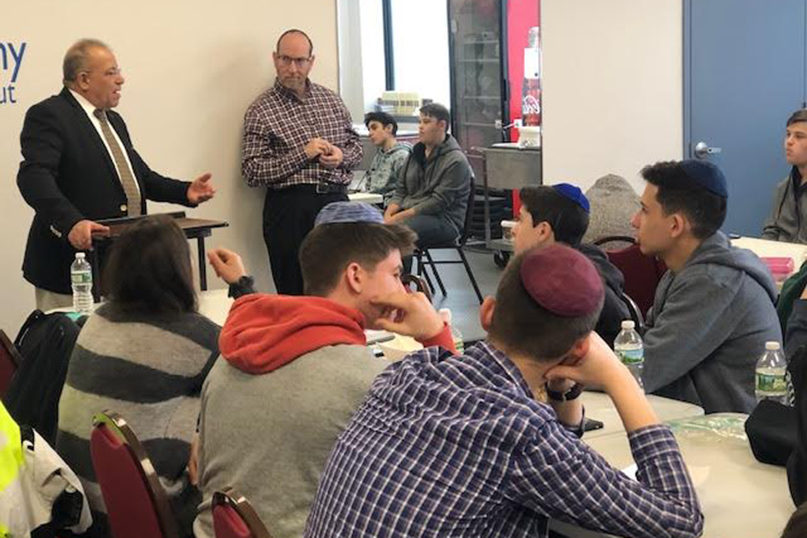
Expert in Arab, Palestinian affairs speaks candidly to Stamford teens
By Judie Jacobson
STAMFORD – “I am a proud Palestinian,” Bassam Eid told a group of more than 40 students at the Bi-Cultural Hebrew Academy-Upper School (BCHA) in Stamford one recent afternoon.
Eid, an internationally renowned political analyst, human rights pioneer and commentator on Arab and Palestinian affairs, was in Connecticut on Wednesday, March 6 to speak at an evening event hosted jointly by United Jewish Federation of Greater Stamford, New Canaan and Darien and UJA/Federation of Greenwich. The Federations included in his itinerary a stop at BCHA to share with BCHA high school students his expert analysis and insider view of the Israeli/Palestinian conflict, and to answer their many insightful questions.
Born in the Jordanian-occupied Old City in East Jerusalem, Eid, 61, spent the first 33 years of his life in Shuafat, a United Nations Refugee Works Agency (UNRWA) refugee camp. He has been a resident of Jericho for close to 20 years.
Eid rose to prominence during the first Palestinian Intifada and was a senior field researcher for B’Tselem, the Israeli Information Center for Human Rights in the Occupied Territories.
“I spent 26 years of my life defending the rights of the Palestinians, first under the Israelis, and then, after Oslo, defending them from Arafat,” he told the teens.
In 1995, following his report on the Palestinian Preventive Security Forces (PSF), he came under attack by some Palestinian leaders for revealing human rights violations committed by the Palestinian Authority (PA). Arrested by Arafat, he was released after 25 hours, with the help of then-U.S. Secretary of State Warren Christopher.
In 1996, Eid founded the Palestinian Human Rights Monitoring Group, which monitors abuses committed by the PA and also deals to some extent with Israel, and supports a democratic and pluralistic Palestine. In 2016, he became chairman of the Center for Near East Policy Research.
Eid lectures worldwide on the Palestinian-Israeli conflict, and is the author of numerous publications. He is a frequent contributor to The Jerusalem Post and Times of Israel. He is also the recipient of numerous international human rights awards and, in 2009, was profiled in the book Next Founders as the leading Palestinian human rights activist.
The following are excerpts from Bassem Eid’s talk with teens at the BCHA-Upper School. (Some quotes have been edited for clarity.)
THE GREAT DIVIDE: FATAH & HAMAS
“Unfortunately, we, the Palestinians, are very divided. From 2007 to today, there exists a big separation between the political parties of Fatah and Hamas, between the West Bank and the Gaza Strip. Nobody is able to bring any kind of unity among the Palestinians – and that division is one of main obstacles to peace between the Israelis and the Palestinians. … It looks like we, the Palestinians, are interested not so much in a two-state solution – that is, two states for two people – rather we are interested in three states for two people.”
“When our leaders try to put pressure on Israel, saying that if Israel doesn’t come to terms with us we are going to declare a Palestinian state, I ask them what that state will be? A state where our people are starving; a state where 54 percent of its population are living in refugees camps? This is not the state we are dreaming of and waiting for. Our leaders have to understand one important fact: that a state needs to be built before it is recognized.”
“Two million people are living as prisoners under Hamas. People are suffering and starving and it looks like there is no change. … I asked some of my friends, ‘Instead of going every Friday to the Israeli border and fighting them, when are you going to go to your own leadership and fight them?’ And they said ‘It is much easier to fight Israelis.’ Because if they fight Hamas there will be mass killing.”
“I don’t see that there is any solution to the current situation in Gaza. Prime Minister Netanyahu is sending millions of dollars in cash to Gaza every month. I suggest Israel keep that money and instead transfer fuel, electricity, medicine, etc. Because the people are not benefiting from that money.”
“Without elections for the PA in the West Bank and Hamas in Gaza, it will be difficult to change the current situation, and it looks like neither the PA nor Hamas is interested in any kind of elections. Two weeks ago there was meeting of civil activists in Ramallah in the West Bank to discuss what will come after Abbas. Five minutes into the meeting the building was surrounded by Palestinian forces who arrested 20 people, drove them to prison and released them only after each one signed a commitment not to participate in that kind of discussion again. I guess that means Abbas will live forever. Such a dictatorship is not interested in any kind of change in the near future.”
ON JUSTICE & DIGNITY
“Most [Palestinians living] in the West Bank want a secure health and education system for their children. That is what they are talking about. They are not talking about settlements, or the foundation of the Palestinian state, or the wall… The majority of the Palestinians are seeking dignity rather than identity. Homeland is not the place where you are born; it is the place where you can find justice, dignity and freedom.”
ON THE PALESTINIAN LEADERSHIP
“Since the Palestinian Authority was created in 1984, we have the most corrupt leadership.”
“As an Arab and Muslim, I don’t want to live in Iraq, Yemen, Libya, Syria… It’s much safer for me to continue to live under the Palestinian/Israeli conflict.”
THE ROLE OF THE INTERNATIONAL COMMUNITY
“I don’t see any enlightened future between Israel and the Palestinians. The international community has become part of the conflict rather than a part of the solution. The solution can only be found between Israelis and Palestinians. We want countries to help but not to interfere between us. So many foreign fingers are playing in the conflict and thus Israelis and Palestinians can’t sit together and find a solution.”
THE IRANIAN THREAT
“Iran was all the time a major threat but Israel is the only country who realized this. Iran had its hands cuffed, but [U.S. President] Obama made them more able to operate as they want. That was one of the major problems. Now, each country realizes the Iranian threat and even the American administration is becoming more and more involved in not allowing Iranians to operate freely.”
“Today, the world realizes more and more the threats [posed by] Iran and there are so many meetings taking place between the Arab countries to discuss Iran. Americans and Israelis are also involved. A few weeks ago at the Middle East summit in Warsaw no one expected to see the Yemen foreign minister sitting next to Netanyahu. Because Iran almost occupied Syria and the only one who can probably deal with that kind of threat is Israel. It will be difficult to coordinate anything without Israel.”
“The Gulf countries are trying to normalize their relationship with Israel. Bahrain, Saudi Arabia, UAE…the countries in the Gulf have become more aware of the threats to their future that Iran poses. So today they are looking for a strong country to help them. … These countries are exchanging delegations with Israel to discuss issues of security cooperation.”
ON MEDIA BIAS
“The media has their own agenda and these days they are very biased. When we talk about human rights violations on the part of Palestinians why doesn’t media report about it? We deserve to be covered, but they only report on Israeli violations.”
IT’S ALL ABOUT THE ECONOMY
“The West Bank has good economic prosperity and Israel is supplying everything. They are standing behind it. These days we have 120,000 Palestinians working inside Israel. Settlements are one of the main sources of income to Palestinians. Because who is building there? We are.”
“Economic prosperity will pave the way to the solution of the Israeli/Palestinian conflict. This is one of the main messages I’m carrying to the EU [European Union] in Belgium.”
BDS IS THE ENEMY
“BDS [Boycott, Divest, Sanction movement] is one of the organizations trying to use the Palestinians in order to gain power and money. The Palestinians have not benefitted from BDS. BDS is committing a genocide against the Palestinians because they are not only kicking people out of their jobs, they are taking away health insurance, etc. Everybody knows the BDS agenda is to destroy Israel and not to bring peace. The Palestinians should not participate in this.”
CROSSING THE LINE
“On Feb. 6, there was news about the young Jewish girl [Ori Ansbachere] who was raped and murdered by a Palestinian. Three days later, I organized a Palestinian delegation to pay condolences to the family. I asked two or three people to join me – 20 came, mostly from the West Bank. It got a lot of coverage in the Israeli press. I am very proud that I did it because I am trying to present the right image of the Palestinians. It is a reaction to those who celebrated [the murder] and I hope it will make a change among Palestinians.”
FINAL THOUGHT
“The Israelis and the Palestinians are patient people and don’t think there will be a quick solution to the conflict. But I hope that the violence will decrease between us because a lot of bloodshed has taken place.”
CAP: Bassem Eid, human rights pioneer and an Arab and Palestinian affairs analyst, discusses the Middle East conflict with students at the Bi-Cultural Hebrew Academy-Upper School in Stamford.








 Southern New England Jewish Ledger
Southern New England Jewish Ledger









